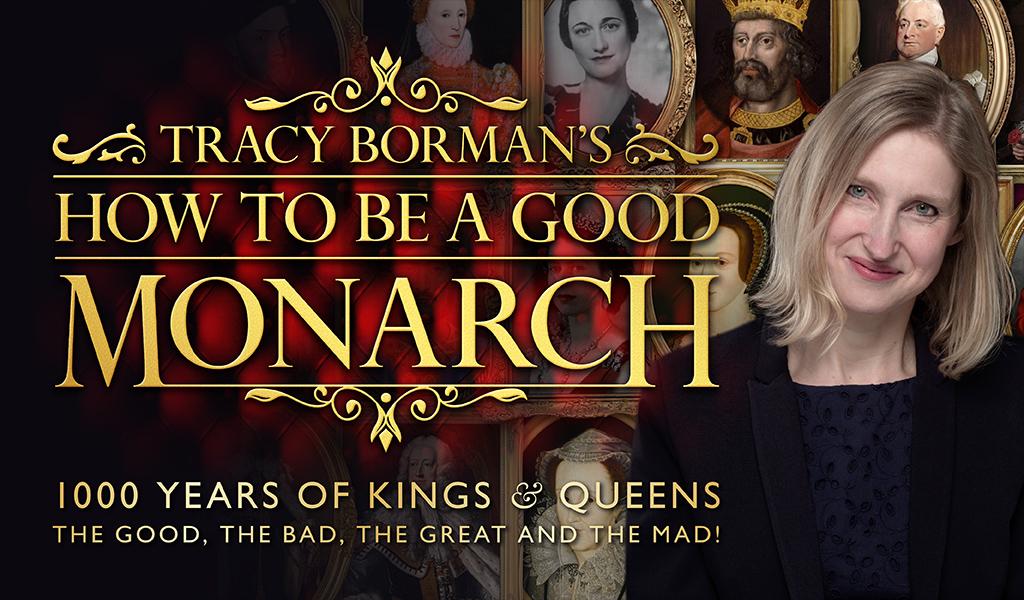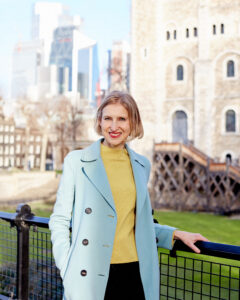
Q&A with Tracy Borman
Get to know Tracy Borman ahead of her show How To Be A Good Monarch in this Q&A.
Tracy Borman Interview
 Q: What inspired you to embark on your first ever national tour, How To Be a Good Monarch – 1000 Years of Kings & Queens?
Q: What inspired you to embark on your first ever national tour, How To Be a Good Monarch – 1000 Years of Kings & Queens?
A: What a moment we’re at! The tour was inspired by the forthcoming coronation. My book, Crown and Sceptre: A New History of the British Monarchy from William the Conqueror to Elizabeth II, originally came out for the Platinum Jubilee. Then, of course, other royal events last year rather overshadowed that. And so, I set to work on an updated edition that went all the way to Charles III (it was published last December). There are so many fascinating lessons to be learned from the past that inform a new monarch and their reign.
Q: What’s the basis of the show?
A: The premise is to show how to be a good monarch, drawing on historical examples. It’s a manual for monarchy really. I’m going to be covering the key do’s and don’ts drawn from the past 1,000 years. It is light-hearted, but there’s some darker history in there, too.
Q: When and how did you fall in love with history?
A: I’ve loved history for as long as I can remember. One of my first summer jobs was dressing up as a Victorian jailer and showing terrified tourists around Lincoln Castle prison. My passion for the subject was really ignited by my ‘A’ Level history teacher. She brought it to life for me – the Tudors in particular. I remember she had portraits of all the monarchs and their courtiers around the walls of the classroom. She also made me realise that history is about human beings, not just dates and events. That has stayed with me ever since.
Q: Why do you think we are so fascinated by the monarchy?
A: You can’t make it up when it comes to the monarchy. Over the years, there have been all sorts of stories in the press about how the monarchy is in crisis. But it’s been through worse before. It is the sheer drama of the monarchy that’s so riveting. You get a king who marries six times, the Virgin Queen…then much darker chapters, like the Princes in the Tower.
Q: Do you have an all-time favourite monarch?
A: It’s Elizabeth I, 100 percent. I came to that decision before writing my history of the monarchy. After researching 42 Kings and Queens, I was prepared to change my mind, but she still came out on top – in fact, even more so. I’ll be revealing why in the show.
Q: Why was she so outstanding as queen, do you think?
A: She ruled with the head, not the heart. She was incredibly disciplined and brilliant at what we would call PR. She made the most of every opportunity to craft her public image and was exceptionally shrewd and clever. Her reign was rightly hailed as a ‘Golden Age’, with the likes of Shakespeare and Raleigh, the victory over the Armada and the emergence of England as a world power.
 Q: What is it about the monarchy that continues to keep us so gripped today?
Q: What is it about the monarchy that continues to keep us so gripped today?
A: Pomp, pageantry and tradition gives the monarchy its ‘X’ Factor. The fact that it’s an institution stretching back over a thousand years is what makes it special. In a rapidly-changing, often frightening world, many people find this sense of something unchanging deeply comforting. There’s also the fact that, in a culture obsessed with celebrities, the royal family has star quality in abundance.
Q: If you were to have an audience with King Charles III, what “do’s” and “don’ts” would you pass on to him?
A: One piece of advice – that he has absolutely nailed already – is start your training early. The earlier you can start learning on the job, the better. And obviously, as the longest-serving ever Prince of Wales, Charles has had more extended training than anybody else.
Don’t disrespect the previous regime. Many times, in history, new monarchs have come in like the proverbial new broom, eager to sweep away the vestiges of the last reign and make their mark. This is all very well if your predecessor was a disaster, but if they were a shining example of monarchy, like Elizabeth II, then it is better to carry on where they left off. England’s first Stuart King, James I, would have been well advised to do this, rather than throwing out all the customs of his illustrious Tudor predecessor, Elizabeth I. Within a matter of weeks of his accession, his new subjects were grumbling about his lack of ‘majesty’.
Q: What do you hope people will take away from this terrific show?
A: I hope that people will have a real sense of the past and of what it can teach us, as well as a bit of reassurance about the future. Things do come around in cycles. The monarchy has weathered a lot of crises in the past. But I also hope people get this sense of a moment in history because it’s such an important time right now. Most people can’t remember when there was last a coronation. Now we’re seeing one and experiencing an entirely new reign. It feels like history in the making.
Q: How would you sum up what makes a good monarch?
A: There is one key ingredient, and it stands true for each one of the forty-two kings and queens since 1066. But if you want to know what it is, you’ll have to come to the show!
Tracy Borman: How To Be A Good Monarch
Royal Historian, broadcaster and Chief Curator of Hampton Court and The Tower of London, Tracy Borman takes us on a gripping, entertaining and informative audio-visual tour of 1000 years of the twists and turns of the British monarchy from William the Conqueror to Charles III in a show packed with the good, the bad, the great and the mad along with birth, romance, beheading, coronation, abdication, marriage, divorce, disaster and triumph.
Tracy Borman: How To Be A Good Monarch is on Thursday 11 May at 7.30pm.

